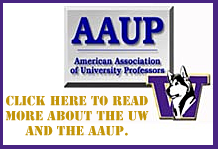So, at long last, our AAUP listserv has been abused to post public shaming dossiers on individual faculty members, complete with insinuations about their politics and characters and paranoid speculations about hidden agendas. Dr. Kaiyala’s contemptible post transports us back to a dark period of UW history. Do the names Joseph Butterworth, Ralph Gundlach, and Herbert Phillips, all former UW faculty, ring a bell?
I will not dignify Dr. Kaiyala’s post with a detailed response, but since I am one of the named individuals will make two broader points:
1) Others may arrogate to themselves the imaginary title of “UW’s leading faculty,” but being fingered as one of only four leading faculty in the on-going unionization process is false and, moreover, entirely undeserved. In my nine years in the Senate and on the Senate Executive Committee, in years on the AAUP-UW Executive Board, and now with UW Faculty Forward, I have come to know and admire dozens and hundreds of colleagues whose devotion to public higher education, our profession, our students, and our beloved university is much more worthy of recognition than my own limited contributions. I feel privileged to stand with these hundreds of dedicated colleagues across our campuses, many of them veterans of real-existing shared governance, who know that faculty unionization is our best option to stand up for a public sector education system under constant attack, reverse the wholesale restructuring of the professoriate and growing student burdens, fight for just and stable working conditions across all our diverse instructional and research situations, defend academic freedom and true academic excellence, and strengthen and re-democratize an increasingly diminished shared governance system.
2) Unionization affords us all an opportunity to engage in a broad, informed and respectful conversation across our campuses, ranks, and specializations about what has ailed public higher education, undermined the promise of both democratized, affordable access and continuing excellence, and led to deep structural imbalances in shared governance at UW. Like others I am distressed to see the AAUP listserv increasingly misused by a few in a manner neither worthy of an academic online forum nor of the seriousness of the topics at hand. The discourse on AAUP listserv has been diminished between the recurring, overly verbose nothingburgers and the occasional drive-by snark, between the passive-aggressive preoccupation with sideshows and the dark brooding over perceived malfeasances, between the belittling of others’ honest intents and arguments and blowing the dog whistles of worn-out slogans.
By contrast, the many faculty in UWFF will continue this much-needed informed debate through direct communications, in department visits across our campuses, by participating in public fora, and in the hundreds of on-going collegial conversations. Together with AAUP-UW and the Bridges Center, we have organized and will offer informative events with respected expert speakers covering all aspects of faculty unionization and the beleaguered public higher education landscape. We will not be deterred by hit pieces such as we have just witnessed, nor by the intervention of the administration that has had the effect of chilling free debate and forcing many of our colleagues and supporters not privileged by tenure to choose to remain anonymous.
C. Giebel
Int’l. Studies / History, UW-Seattle
EB, AAUP-UW
OC, UWFF
